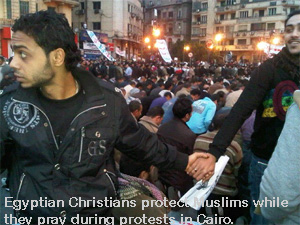 While much of the prognostication about Egypt's future has focused on the rise of the Muslim Brotherhood and the threat that it could pose to Egypt's Christian minority, one need only view the massive demonstrations that have roiled the streets of Cairo, Suez, and Alexandria to recognize that this is a multi-faith movement against a regime whose brutality and repression have been felt by Muslims and Christians alike. Indeed, when the dust of this crisis finally settles, the most iconic image of the protests against the 30-year dictatorship of Hosni Mubarak may be that of the Christians who formed a human chain around Muslim protesters in Tahrir Square, so that they could safely perform their Friday prayers.
While much of the prognostication about Egypt's future has focused on the rise of the Muslim Brotherhood and the threat that it could pose to Egypt's Christian minority, one need only view the massive demonstrations that have roiled the streets of Cairo, Suez, and Alexandria to recognize that this is a multi-faith movement against a regime whose brutality and repression have been felt by Muslims and Christians alike. Indeed, when the dust of this crisis finally settles, the most iconic image of the protests against the 30-year dictatorship of Hosni Mubarak may be that of the Christians who formed a human chain around Muslim protesters in Tahrir Square, so that they could safely perform their Friday prayers.
That image of Christians protecting Muslims at prayer calls to mind a similar event that took place last year, after the bombing of Saints Church in Alexandria by a (non-Egyptian) member of an al-Qaeda affiliated group from Gaza known as the Army of Islam. Lost in the media frenzy that followed that despicable act, which left 21 dead, was the fact that a few days later thousands of Egyptian Muslims gathered at Coptic Churches across the country, forming human chains of protection around their Christian countrymen as they observed Christmas Eve mass. In the words of one Egyptian Muslim at the gatherings: "This is not about us and them. We are one. This was an attack on Egypt as a whole, and I am standing with the Copts because the only way things will change in this country is if we come together." According to the Egyptian daily Al-Ahram, in the days following the attack, solidarity between Muslims and Christians in Egypt soared as millions of Egyptians changed their Facebook profile pictures to the image of a cross within a crescent: the symbol of unified Egypt.
The same image of the cross within a crescent has been ubiquitous on the streets of Egypt these last two weeks, as thousands of Christians have joined their Muslim brethren to call for an end to Mubarak's regime. "We came here to show that every Egyptian should be here and wants to be here," said one Egyptian Christian taking part in the demonstrations. "There is no difference between Christians and Muslims [on this matter]." When some members of the Muslim Brotherhood began chanting their group's slogan -- "Islam is the Solution" -- at a recent protest, they were drowned out by Egyptian youth chanting: "Christians and Muslims, we are all Egyptians." And when Egypt's notoriously corrupt police forces fled the streets of Cairo, Muslims and Christians joined together to form neighborhood committees to provide security to one another.
The protests against Mubarak, like the attack on Saints Church, seem to have brought the the Muslim and Christian communities closer together. As one young demonstrator explained to the Egyptian newspaper Al-Masry Al-Youm, "Mubarak is the one who created a 'fitna' [rift] between the Muslims and the Christians in Egypt over the past 30 years." Of course, it remains to be seen whether this solidarity will last into the formation of a new government once Mubarak leaves. But what cannot be denied is that the aspiration for freedom and democracy, and the desire to be freed from the yoke of dictatorship, are sentiments shared by all Egyptians, no matter where they pray.
Dr. Reza Aslan, an internationally acclaimed writer and scholar of religions, is a contributing editor at the Daily Beast. Aslan is President and CEO of Aslan Media Inc, whose holdings include BoomGen Studios, a mini-motion picture and media company focused entirely on entertainment about the Greater Middle East and its Diaspora communities. Born in Iran, he now lives in Los Angeles where he is Associate Professor of Creative Writing at the University of California, Riverside.
Got something to say about what you're reading? We value your feedback!